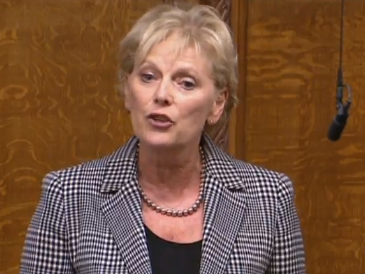
A Conservative MP has called for a new law to stop police suspects being named by the media until they are charged, suggesting it could be called “Cliff’s Law” after Sir Cliff Richard’s privacy win against the BBC.
Anna Soubry MP, who was a regional broadcast journalist for 14 years until 1995, used Prime Minister’s Questions today to ask Theresa May to look at bringing in the new law.
Sir Cliff was today awarded £210,000 in damages by the High Court over BBC News coverage of a police raid on his home in August 2014, following an allegation of historical child sexual assault.
Sir Cliff has always denied the claim and no charges were ever brought.
Soubry said the BBC, which included helicopter footage in its report of the raid on Sir Cliff’s home in Berkshire, had “behaved atrociously”, adding coverage amounted to an “illegal invasion” of Sir Cliff’s privacy.
She told Parliament: “Sir Cliff is not alone and it’s not confined to sexual offences. Suspects should not be named by the media until such time as they are charged.”
Soubry said she would be “more than happy” to call the bill Cliff’s Law and acknowledged that there would be exceptional cases.
Back in 2011 Soubry tabled a Private Members Bill that proposed a blanket ban on identifying people questioned by police, but it was dropped after she was told the then Attorney General would look at the issue.
The Prime Minister, who was Home Secretary when the issue was debated in 2011, told Soubry today that it was an “important” but “difficult” issue which “does have to be dealt with sensitively”.
However she appeared to disagree with Soubry’s stance, saying: “There may well be cases where actually the publication of a name enables other victims to come forward and therefore to strengthen the case against an individual.
“So this is, I have to say, I think this is not either you do all of one or all of another. This is an issue for careful judgement – but in exercising that careful judgement the police need to recognise their responsibilities and the media need to recognise their responsibilities as well.”
In his judgement today, Mr Justice Mann, said that although information that a well-known celebrity was under investigation for historical sexual abuse would have contributed to a general public debate around such cases, actually identifying Sir Cliff was not a matter of public interest.
He said: “Knowing that Sir Cliff was under investigation might be of interest to the gossip-mongers, but it does not contribute materially to the genuine public interest in the existence of police investigations in this area.
“It was known that investigations were made and prosecutions brought. I do not think that knowledge of the identity of the subject of the investigation was a material legitimate addition to the stock of public knowledge for these purposes.”
Speaking outside court today, BBC director of news and current affairs Fran Unsworth warned the judgement had created new case law and marked a “dramatic shift against press freedom”.
She said: “This impacts not just the BBC, but every media organisation. This isn’t just about reporting on individuals. It means police investigations, and searches of people’s homes, could go unreported and unscrutinised.
“It will make it harder to scrutinise the conduct of the police and we fear it will undermine the wider principle of the public’s right to know. It will put decision-making in the hands of the police.
“We don’t believe this is compatible with liberty and press freedoms – something that has been at the heart of this country for generations.”
In his report on the culture, practice and ethics of the media, published in 2012, Sir Brian Leveson said names of police suspects who have not been charged should not be released to the press or public.
He said: “I think that it should be made abundantly clear that, save in exceptional and clearly identified circumstances (for example, where there may be an immediate risk to the public), the names or identifying details of those who are arrested or suspected of a crime should not be released to the press nor the public.”
Picture: Parliament TV
Email pged@pressgazette.co.uk to point out mistakes, provide story tips or send in a letter for publication on our "Letters Page" blog
